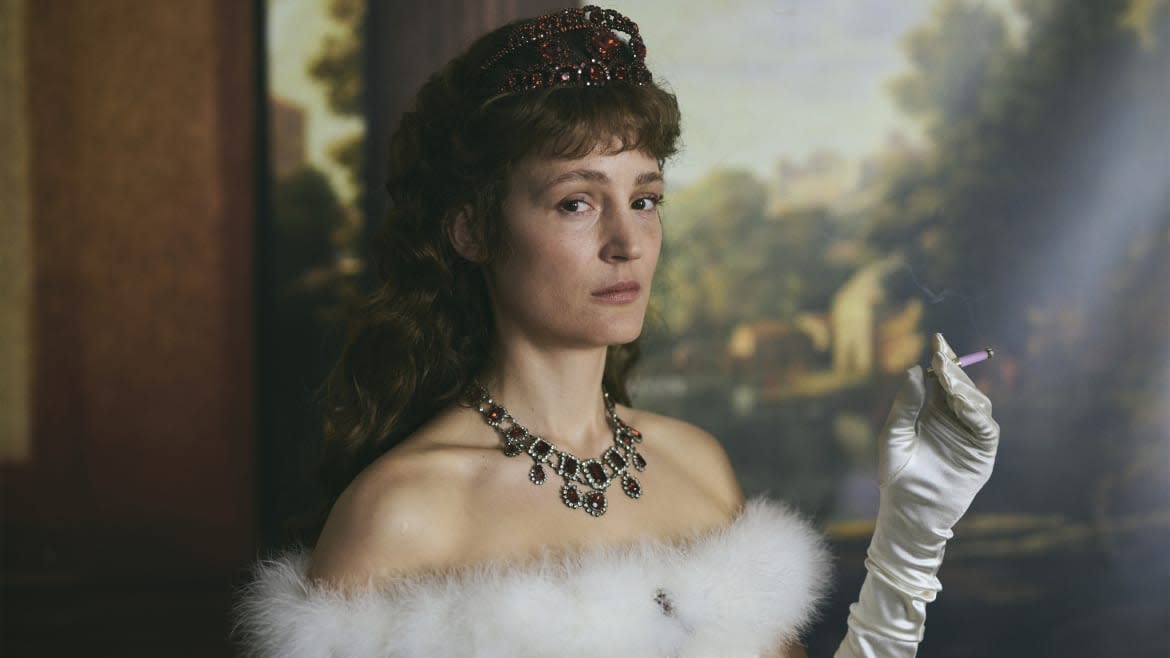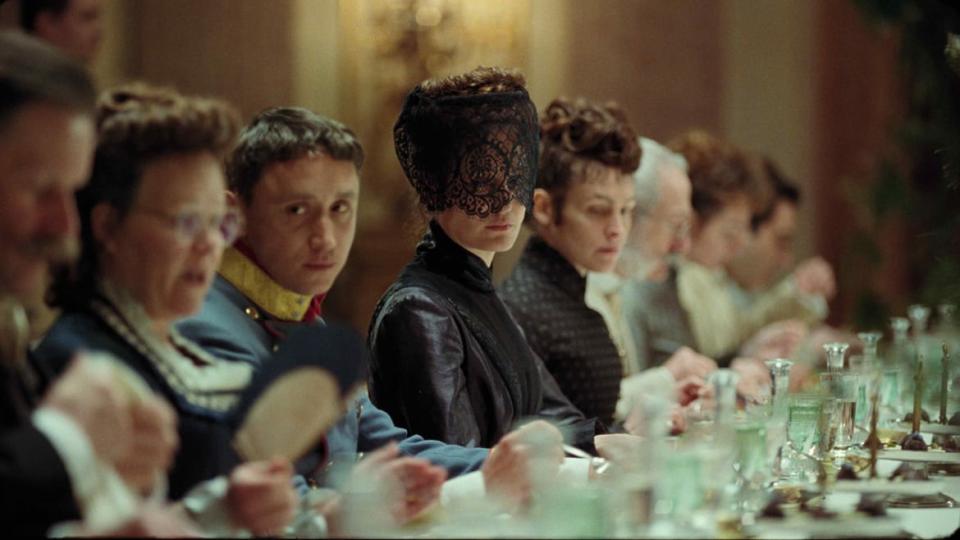‘Corsage’: The Story of the Original Princess Diana

The monarchy is in decline, and so too is Empress Elisabeth of Austria, in Corsage, Marie Kreutzer’s biographical portrait of the 19th-century royal, who has often been likened to Princess Diana because of her subjugation at the hands of a patriarchal system that affords women imprisonment rather than freedom.
A kindred spirit to Pablo Larraín’s Spencer and Sofia Coppola’s Marie Antoinette, the writer/director’s follow-up to The Ground Beneath My Feet is a sumptuous period piece with a contemporary spirit, casting a distinctly liberal-minded gaze at its protagonist. Preachy, however, this stately drama is not, and despite its anachronisms proving largely unnecessary, it boasts an excellent Vicky Krieps performance as a lonely soul who yearns to be more than merely a decoration.
Elisabeth flips off her dining guests and sticks her tongue out at a doctor during the course of Corsage, which hits theaters Dec. 23, all as Camille’s romantically despairing modern pop songs cascade over slow-motion shots of the empress riding through her castle’s grounds and navigating its long, cold corridors.
Such gestures are designed to stick out, as well as to emphasize the commonality between then and now, and in that regard they’re mildly successful. Still, it’s difficult to comprehend why Kreutzer thought them particularly necessary, since the remainder of her action makes those connections clear, and with a far more evocative gracefulness and sense of pent-up disaffection and frustration.
If the director’s contemporizing feels a bit like pandering to audiences who can’t stomach historical fare without of-the-moment flourishes, Corsage thankfully goes light on them, instead primarily focusing its attention on the bone-deep discontent afflicting Elisabeth, who in 1878 is the forty-year-old Bavarian-born wife of Austrian Emperor Franz Josef (Florian Teichtmeister).
Though she lives in the lap of luxury, Elisabeth is a woman trapped, her free spirit suffocated by the dictates of court and her subservient position at it. Meant not to govern the kingdom or even to voice opinions but, rather, to “represent” the monarchy as a lovely figurehead, she’s at once the subject of celebratory songs and admiring glances and an individual who’s oppressed and marginalized at every turn.
Elisabeth is introduced holding her breath under water as her servants time how long she can stay submerged—a vision of both her smothered, voiceless condition and her rebellious impropriety. Tabloid-perpetuated gossip about her weight and age follows Elisabeth wherever she goes, begetting pressure to watch what she eats and to mind her waistline (and to demand that her corset be pulled ever tighter).
The Best Movies of 2022: From ‘Elvis’ to ‘Banshees of Inisherin’
Her dalliances with a riding instructor and a cousin are frowned upon by her acquaintances, as well as her son Rudolf (Aaron Friesz) and daughter, the latter of whom is also embarrassed by her mother smoking in public. Franz, meanwhile, is frustrated by his downcast spouse’s inability to find lasting happiness in almost anything or anyone she seeks out, as well as by her bristling at the responsibilities and restrictions of her rank.
Be it having to endure a painter remarking upon her “complexion,” or quietly seething at the attention paid to an 18-year-old bride (Alice Prosser)—who’s already on her second marriage, and who later refers to the empress-in-disguise as an “experienced woman”—Elisabeth recognizes, and resents, that her value is directly related to her youthful beauty and vitality.
It’s not that she doesn’t also mourn the loss of those very attributes; when inventor Louis Le Prince (Finnegan Oldfield) shows her his new motion-picture camera, Elisabeth is drawn to the device for its ability to preserve the present (and without sound, to let her scream without repercussions), even if such preservation is also a means of confinement. That push-pull dynamic is at the heart of Corsage, and it governs Elisabeth as she travels to and fro, finding scant solace in the company of snobby acquaintances and doting handmaidens.
The only time Elisabeth seems to be truly at home is when she visits a hospital for the war-wounded and a sanitarium for women committed for various faux-ailments that boil down to “melancholy.” Sharing a smoke while lying beside a soldier who’s lost his leg, and looking with deep, compassionate understanding at a female patient trapped in—and tied to—a caged bed, Elisabeth relates to others’ suffering because she cannot escape her own.

Allowed to fence but denied any genuine means of fighting back against her stifling state of affairs, she instead grasps onto joy whenever it fleetingly appears. That joy is on the spectrum from would-be suitor King Ludwig II of Bavaria (Manuel Rubey) pouring chocolate into her mouth until it spills onto her face and dress, to a late act of hair-cutting defiance that produces an audible gasp from her daughter, who’s already been so trained in the ways of propriety and subservience that she won’t cry because that would be “bad manners.”
Elisabeth is forced to mask her feelings of anger, disappointment, betrayal and jealousy behind a placid and poised exterior, and so too does Corsage’s feminist outrage boil beneath its exquisite surface. Evoking the empress’ anguish through a series of small encounters, Kreutzer’s film is a delicate affair punctuated by pointed comments and glances, and dominated by Krieps’ dexterous lead turn.
The 15 Biggest Breakout Stars of 2022, From Austin Butler to Stephanie Hsu
At once imperious and forlorn, Krieps posits Elisabeth as a long-suffering victim of a chauvinistic world that seeks to reduce her to merely an ornament, as well as a defiant non-conformist engaged in minor acts of insurrection against the status quo. It’s a mission that’s invariably doomed to fail, which amplifies the material’s tragedy, and yet Krieps’ empathetic vigor and gloom—spied in her sly stares and short-lived bursts of bliss—prevent the proceedings from devolving into sanctimoniousness.
Corsage imagines Elisabeth as a revolutionary simply by nature of her desire to be more than merely a glorious trophy to be shown off to admiring masses desperate for a brief respite from their own downtrodden existences. Yet incapable of fast-forwarding herself into a future that might prize her independence, Elisabeth is given few choices in Kreutzer’s film for actual escape, bound—wherever she goes—by figurative chains. Consequently, just as the cinema provides the empress with a dream of freedom that’s intertwined with captivity, the finale’s wish-fulfillment vision of liberation is also, inevitably, one of death.
Get the Daily Beast's biggest scoops and scandals delivered right to your inbox. Sign up now.
Stay informed and gain unlimited access to the Daily Beast's unmatched reporting. Subscribe now.

